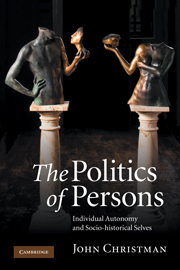7 - The historical conception of autonomy
Published online by Cambridge University Press: 15 December 2009
Summary
So far in our examination of the self, we have taken on board various postulates concerning the self's constitutive connections to social factors and relations as well as its own history and narrative trajectory. We have also considered the way that social selves might be modeled in political principles underwriting modern democracies whose populations are marked by multiform pluralism. In that discussion we also saw that the protection of individual capacities to participate in such democratic forms could be valued in ways consistent with the assumption of the socio-historical self. The idea of individual autonomy, it will be suggested, can play the role of expressing the locus of that protection.
Approaches to the idea of autonomy, until recently at least, have for the most part failed to consider an agent's past as crucial in thinking about self-government. Connections to one's autobiographical narrative have been occluded in laying out what it means to be an independent, competent, authentic agent. But if I am right that the self should be seen as having a temporally extended structure, as diachronic, and autonomy is in some way self-government, then we must somehow build in reference to personal history in our conception of that latter notion.
Recently, however, philosophers and other theorists have been developing views of moral responsibility and personal autonomy that have turned increased attention to the historically and socially embedded nature of the person.
- Type
- Chapter
- Information
- The Politics of PersonsIndividual Autonomy and Socio-historical Selves, pp. 133 - 163Publisher: Cambridge University PressPrint publication year: 2009



